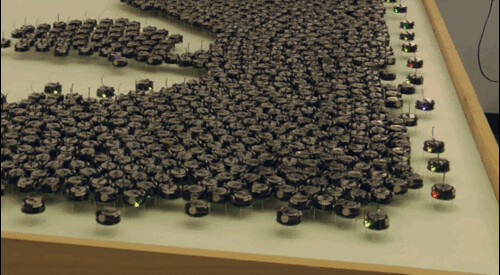The email sent will contain a link to this article, the article title, and an article excerpt (if available). For security reasons, your IP address will also be included in the sent email.
Hey, it's HighScalability time:

Not spooky at all. A 1,000 robot
self-organizing flash mob.
- 400 ppm: global CO2 concentration; 13.1 billion: distance in light-years of farthest galaxy
- Quotable Quotes:
- Pied Piper: It’s built on a universal compression engine that stacks on any file, data, video or image no matter what size.
- Bokardo: 1 hour of research saves 10 hours of development time
- @12Knocksinna: Microsoft uses Cassandra open source tech to help manage the 500+ million events generated by Office 365 hourly (along with SQL and Azure)
- @antirez: Redis had a lot of client libs ASAP. By reusing the Redis protocol, Disque is getting clients even faster, and 2700 Github stars in 9 days!
- @blueben: AWS Glacier seems like a great DR option until you realize it costs $180,000 to retrieve your 100TB archive in an emergency.
- Peter Diamandis: The best way to become a billionaire is to solve a billion-person problem.
- Cordkillers: YouTube visits up 40% from last year
- @acroll: "It's about economics not innovation, otherwise we'd all be flying Concorde instead of Jumbo Jets." @JulieMarieMeyer #StrataHadoop
- @DLoesch: Start time delayed because cable systems are overloaded due to PPV buys. Insane. Don't snooze, don't lose! #MayPac
- grauenwolf: This is where unit test fanboys piss me off. They claim that they can't use integration tests because they are too slow. I claim that they need integration tests to find their slow queries.
- nuclearqtip: The open source world needs a standardized trust model for binary artifacts.
- Greg Ferro: SDN and SNA are about as similar Model T Ford & any modern car. For the record, no drives a Model T Ford to work everyday. Stop comparing SDN to SNA. Its pointless.
- Urs Hölzle: Now the decade of work we put into NoSQL is available to everyone using GCP. One way it shows that we've been working on this longer than anyone else: 99% read latency is 6ms vs ~300ms for other systems.
- Swardley: Cloud is not about saving money - never was. It's about doing more stuff with exactly the same amount of money. That can cause a real headache in competition.
- Johns Hopkins: scientists have discovered that neurons are risk takers: They use minor "DNA surgeries" to toggle their activity levels all day, every day.
- Tesla's Powerwall has already sold out. So will Tesla's next gigafactory be a terafactory or a petafactory?
- Something to keep in mind when hiring: 21% of [NFL] Hall of Fame players were selected in the 4th round or later.
- Move along, nothing to see here. Brett Slatkin: I wonder how long it will be before people realize that all of this server orchestration business is a waste of time? Ultimately, what you really want is to never think about systems like Borg that schedule processes to run on machines. That's the wrong level of abstraction. You want something like App Engine, vintage 2008 platform as a service, where you run a single command to deploy your system to production with zero configuration.
- Can any product withstand Aphyr's Jepsen partition torture test? Aeropspike, Elasticsearch, MongoDB, RabbitMQ, Riak, Cassandra, Kafka, NuoDB, Postgres, Redis, all had problems when stress tested under network partitions. Not surprising really, as Aphyr says, "Distributed systems design is really hard." That we find problems in popular well regarded products indicates that "We need formal theory, written proofs, computer verification, and experimental demonstration that our systems make the tradeoffs we think they make. As systems engineers, we continually struggle to erase the assumption of safety before that assumption causes data loss or downtime. We need to clearly document system behaviors so that users can make the right choices. We must understand our systems in order to explain them–and distributed systems are hard to understand." gmagnusson has a good sense of things: "I admire the work that Aphyr does - though at the end of the day, I need to build systems that work for the problem I'm trying to solve (and I have to choose from real things that are available). These technologies in general are trying to address really hard problems and design and architecture is the art of balancing tradeoffs. Nothing is going to be perfect. Yet."
Don't miss all that the Internet has to say on Scalability, click below and become eventually consistent with all scalability knowledge (which means this post has many more items to read so please keep on reading)...














 Return to Article
Return to Article